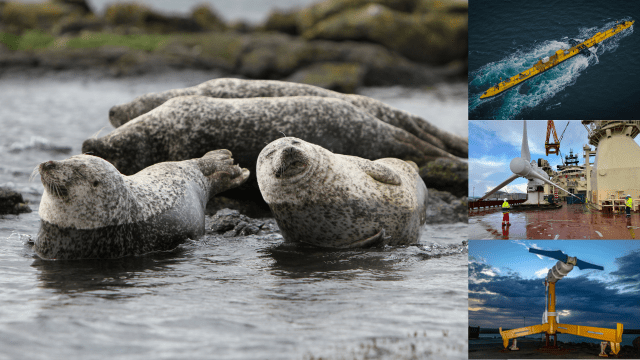Return to prior list…
The tidal stream energy sector urges joint efforts to tackle consent issues and expedite clean energy development
A recent report published today, Managing the Consent Risk of Harbour Seal Interaction in the Scottish Tidal Energy Sector, outlines essential recommendations to support effective consenting to foster the growth of tidal stream energy in Scotland while addressing ecological issues – particularly the possible effects on harbour seals.
Supported by Crown Estate Scotland and Highlands and Islands Enterprise, the Tidal Industry Seal Project (TISP) report was created with insights from eight prominent organizations in tidal energy and ecological assessment.
As a reliable and constant source of renewable energy, tapping into the full potential of tidal stream energy will enhance energy security and promote economic expansion – crucial for Scotland and the UK to achieve their long-term net zero goals.
Home to some of the globe’s most robust tides, the Pentland Firth and Orkney Waters region serves as the hub of the UK’s tidal energy industry. More technologies have been showcased, and greater tidal power harvested from its waters, than in any other part of the world. This distinctive locale provides a platform for advancing marine energy at substantial scales, informed by local expertise and environmental context.
Nonetheless, the development of commercial-scale projects is encountering hurdles in advancing responsibly due to the complexities, uncertainties, and lengthy lead times associated with the current regulatory structure. Although comprehensive monitoring thus far has found no indication of seal-turbine collisions, a significant level of caution is still exercised concerning the perceived risk – especially regarding the ongoing decline of harbour seals in the region. This emphasizes the necessity for science-driven, balanced approaches that ensure ecological protection while keeping pace with readiness for large-scale deployment.
The tidal energy sector has established a regional developer group and is dedicated to collaborating with regulators and research bodies to fortify the evidence base concerning seal collision risks with tidal turbines and enhance the reliability and precision of impact evaluations. This might involve the formulation of effective mitigations, improved utilization of existing data, exploring avenues to improve the environment, and testing new monitoring technologies.
TISP delineates a series of proposals advocating for united action among government, industry, regulators, and key implementation entities to bolster policy, planning, evidence, and monitoring frameworks.
Realizing this unified approach will necessitate proportionate, solution-oriented regulation, developed alongside key stakeholders including NatureScot, that actively promotes the responsible deployment of tidal stream energy in alignment with national aims. This methodology should be grounded in statistical techniques and regional frameworks that better mirror population-scale ecological dynamics and long-term environmental transformations.
Dr Ewan Edwards, Environmental Specialist at Xodus delineates:
“Harbour seal populations around Orkney and the northern coast of Scotland have experienced a sharp decrease for approximately 20 years. This is typically attributed to elements such as competition for sustenance with other species, predation by orca or grey seals, and potentially biotoxins from algal blooms.
“Extensive surveillance of operational tidal endeavors in Scotland has found no evidence of seal-turbine collisions. Conversely, data indicates that seals tend to evade functioning turbines, particularly during peak currents.
“The project team firmly believes that the weight of evidence suggests that collisions between harbour seals, or any other marine mammals, and tidal turbines are fortunately exceedingly rare, and the risk of collision remains a theoretical concern, rather than a genuine threat.”
Donald Leaver, Environment and Consents Manager at EMEC, remarked:
“We acknowledge that for tidal energy to expand, a cooperative effort is essential to better comprehend whether the risk of seals colliding with turbines is a legitimate concern. Innovative projects spearheaded by MeyGen, Nova Innovation, and Orbital Marine Power have explored this issue over several years and, thus far, have not observed any signs of seal-turbine interactions.
“With multiple new initiatives in the Pentland Firth and Orkney Waters slated for development over the forthcoming decade, supporting Scottish and UK government objectives for energy security and climate resilience, it is crucial that this consent ambiguity is resolved in a collaborative, science-oriented manner to facilitate sustainable development alongside the safeguarding of our marine ecosystems.”
Fraser Johnson, O&M Manager at MeyGen, stated:
“We take pride in having played a leading role in enhancing how we evaluate and manage environmental risks associated with tidal energy. This report illustrates the considerable strides the sector has made; however, to realize its full potential, we must persist in collaborating, sharing our insights, and maintaining this momentum.
“At MeyGen, we are devoted to environmental stewardship, but the consenting framework must progress to reflect both the latest evidence and ensure that the scale of this critical technology is achieved. Tidal stream energy has proven its capability to deliver reliable, scalable renewable power, thereby fostering a flourishing sector. We must establish a framework that promotes responsible growth, cultivates trust, and yields long-term benefits for communities, the environment, and investors in a more resilient energy future. This endeavor is part of our long-term commitment to the region, and we look forward to ongoing discussions to support practical solutions.”
The report was produced by a consortium comprising Xodus Group Ltd, Carronside Consultancy Ltd, SAE Renewables Ltd, European Marine Energy Centre Ltd, Eurona Consultancy Ltd, Burges Salmon LLP, Orbital Marine Power Ltd, and Nova Innovation Ltd.


